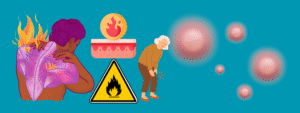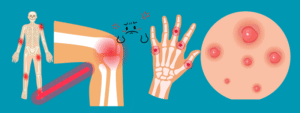Inflammation and Disease is basically defines as our body’s natural defense mechanism —That is basically a way our immune system protects us from injury, infection, or infectious germs.
When something dangerous or infectious affects our body (like bacteria, viruses, or a cut), our immune system discharge some chemicals that cause redness, swelling, heat, and sometimes pain in that infected area . In this way inflammation is a process that helps remove the harmful microbes and starts the healing process to get rid from them .
Types of Inflammation:
1:Acute Inflammation and Disease (Short-Term):
This type of inflammation usually happens suddenly , for example, when we get a cut, bruise, or infection. The infected area becomes red, swollen, and warm, but heals within a few days or weeks.
Example: A sore throat from a cold or a swollen ankle after twisting it.
2:Chronic Inflammation and Disease (Long-Term):
This type of inflammation occurs when our body stays in a constant state of alert, even without any type of infection or injury. Over time, it can damage tissues and lead to diseases such as:
- Heart disease
- Diabetes
- Arthritis
- Cancer
- Alzheimer’s disease
Signs Your Body Might Be Inflamed:
While from both types , chronic inflammation and disease can be silent, but some warning signs may include:
- Persistent fatigue and low energy
- Unidentified aches and pains
- Digestive issues or bloating
- Frequent infections
- Skin problems such as rashes or acne
- Difficulty in losing weight
If we really have these symptoms or may have a family history of chronic diseases.it would be good decision to consult doctor about getting tested.

Suggested Tests for Inflammation and Disease :
Doctors use specific blood tests to measure inflammation levels in your body:
- C-Reactive Protein (CRP):
High CRP levels can signal persistent inflammation and this may be the indication of heart disease . - Erythrocyte Sedimentation Rate (ESR):
This test is conducted to measures how quickly red blood cells settle in a test tube. If the value is greater then this will lead to - High-Sensitivity CRP (hs-CRP):
Early inflammation is detected by amore sensitive version of CRP .It is especially suggested in cardiovascular disease. - Fibrinogen and Interleukin-6:
These are other markers that help assess our immune system’s activity.
Are Test For Inflammation Help or Useful ?
In some ways it would be better to do test to measure inflammation .
Assessing an inflammatory condition :
In some cases there is a rare condition called Giant cell arteritis, in this case the ESR is nearly above normal .If the symptoms such as severe headache and jaw pains suggests that the infected person may have such disease. The higher range or level indicates that the disease is present .While the normal value argues against this disease .
Monitoring an Inflammation condition :
When someone has rheumatoid arthritis, As ESR or CRP or both test help diagnose how much the disease is in active position and how well the treatment is working .
But in some cases none of these test provide perfect results. Sometimes False or negative results occur when inflammation is actually present in the body .It will happen when abnormal test results suggest inflammation even when one is present ,
Who Should Consider Inflammation Testing?
Testing is necessary if :
- Have a family history of heart disease, diabetes, or autoimmune disorders
- Experience persistent fatigue, pain, or unexplained symptoms
- Someone Living with chronic stress or poor diet
- May be overweight or have metabolic syndrome
- Addict to smoking or have high cholesterol level
If these tests are conducted then it will be helpful in identifying inflammation early , Don’t get it late ,just do before major symptoms appear — allowing lifestyle and diet changes to prevent serious illness later.
Can We Diminish Inflammation Naturally?
Absolutely! There are some possible inflammation control ways which we can use before it becomes a problem:
- Must eat anti-inflammatory foods like fruits, vegetables, olive oil, nuts, and fatty fish.
- Try to limit processed foods, sugar, and red meat.
- Do Exercise regularly— even a daily walk helps us get rid .
- Must get enough sleep(7–8 hours nightly daily ).
- Try to manage or overcome stress with meditation, prayer, or deep breathing.

Why routine testing isn’t recommended?
- Natural response: Acute inflammation is a normal and necessary part of the healing process.
- Risk of anxiety: Testing healthy people who are simply curious may lead to unnecessary anxiety if the results are slightly elevated and don’t lead to a clear diagnosis.
- Potential for false results: Some research indicates that inflammation and disease tests can have false positives and false negatives, meaning they may be inaccurate for some individuals.
- Focus on lifestyle: For general health, the focus should be on a healthy lifestyle, which includes a balanced diet, regular exercise, and sufficient sleep, rather than on specific inflammation tests.
The Bottom Line:
Inflammation is our body’s way of healing — but when it lingers, it becomes a silent threat. Testing for inflammation can be a smart step in understanding one’s overall health and preventing chronic disease.
If one really feel “off” without a clear reason, talk doctor’s appointment . A simple blood test could give the answers ,What body’s been quietly trying to tell .
Why It Matters:
While inflammation helps us heal, too much of it for too long can harm the body. That’s why doctors sometimes test for inflammatory markers in blood (like CRP or ESR) to check current health status.
